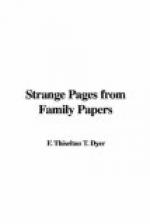But, occasionally, the effect of a family curse, through the misappropriation of property, has been more sweeping and speedy in its retribution, as in the case of Furvie or Forvie, which now forms part of the parish of Slains, Scotland—much, if not most of it, being covered with sand. The popular account of the downfall of this parish tells how, in times gone by, the proprietor to whom it belonged left three daughters as heirs of his fair lands; who were, however, most unjustly bereft of their property, and thrown homeless on the world. On quitting their home—their legal heritage—they uttered a terrible curse, which was quickly accomplished, and was considered an unmistakable sign of Divine displeasure at the wrong they had received. Before many days had elapsed, a storm of almost unparalleled violence—lasting nine days—burst over the district, and transformed the parish of Forvie into a desert of sand;—a calamity which is said to have befallen the district about the close of the 17th century. In this way, many local traditions account for the ruined and desolate condition of certain wild and uninhabited spots. Ettrick Hall, for instance, near the head of Ettrick Water, had such a history. On and around its site in former days there was a considerable village, and “as late as the Revolution, it contained no fewer than fifty-three fine houses.” But about the year 1700, when the numbers in this little village were still very considerable, James Anderson, a member of the Tushielaw family, pulled down a number of small cottages, leaving many of the tenants—some of whom were aged and infirm—homeless. It was in vain that these poor people appealed to him for a little merciful consideration, for he refused to lend an ear to their complaints, and in a short time a splendid house was built on the property, known as Ettrick Hall. What was considered by the inhabitants far and wide as an act of cruel injustice incurred its own punishment, for a prophetic rhyme was about the same period made on it, by whom nobody could tell, and which, says James Hogg, writing in the year 1826, has been most wonderfully verified:
Ettrick Hall stands on yon
plain,
Right sore exposed to wind
and rain;
And on it the sun shines never
at morn,
Because it was built in the
widow’s corn;
And its foundations can never
be sure,
Because it was built on the
ruin of the poor.
And or an age is come and
gane,
Or the trees o’er the
chimly-taps grow green,
We kinna wen where the house
has been.
The curse that alighted on this fair mansion at length accomplished its destructive work, because nowadays there is not a vestige of it remaining, nor has there been for these many years; indeed, so complete was the collapse of this ill-fated house, that its site could only be identified by the avenue and lanes of trees; while many clay cottages, on the other hand, which were built previously, long remained intact. Equally fatal, also, was the curse uttered against the old persecuting family of Home of Cowdenknowes—a place in the immediate neighbourhood of St. Thomas’s Castle.




